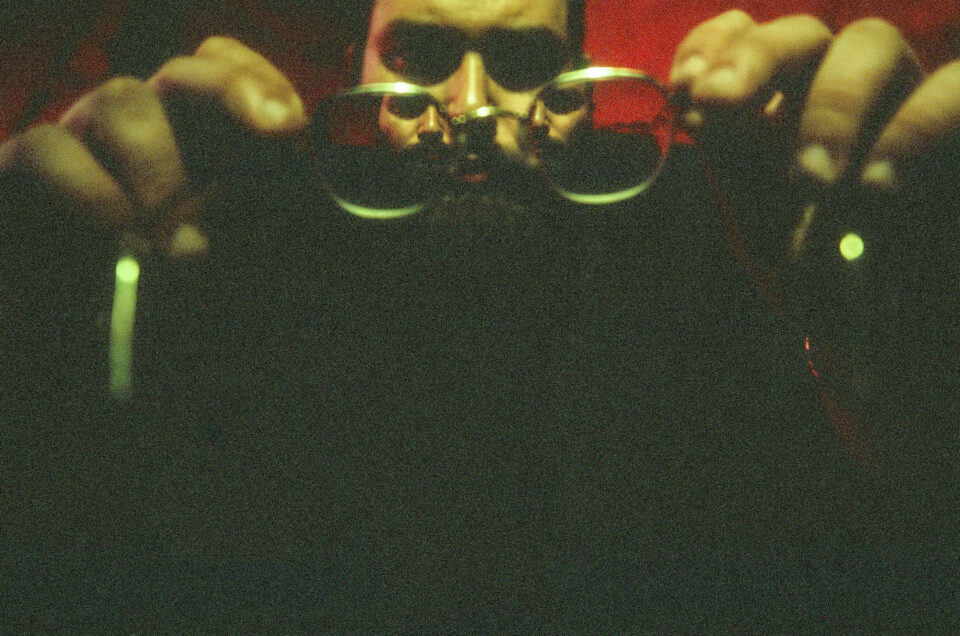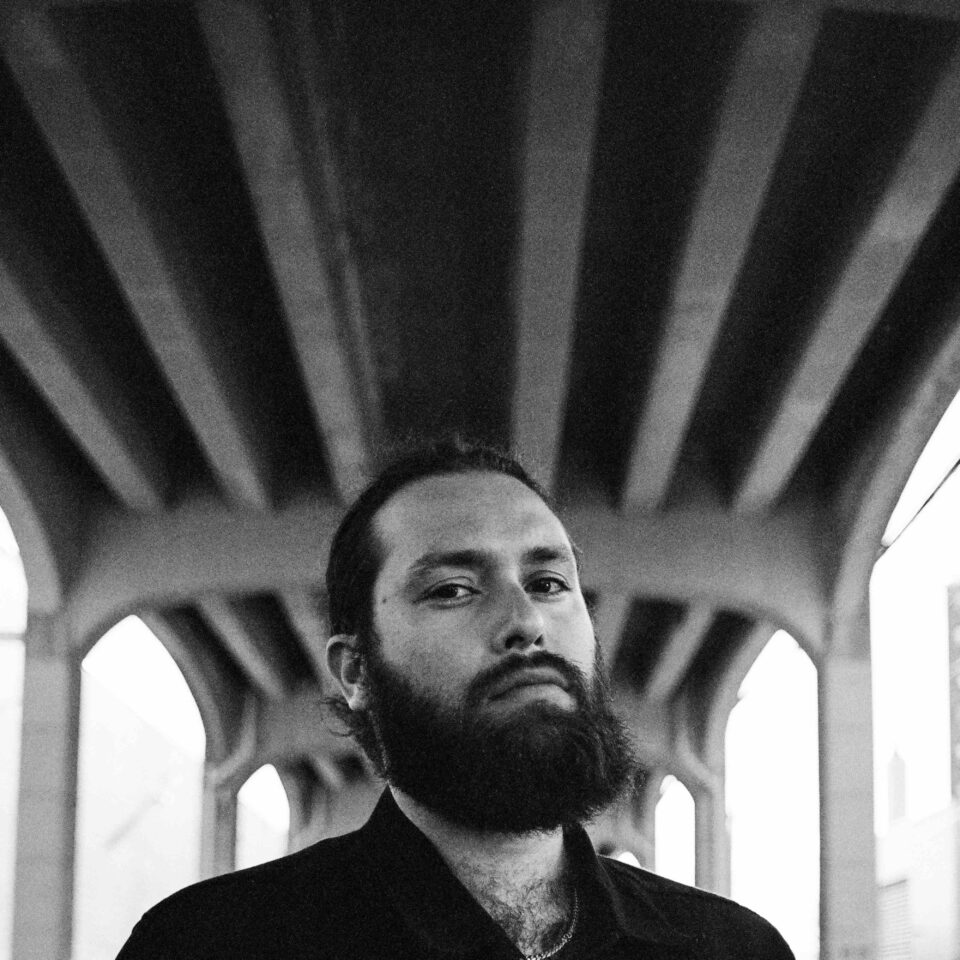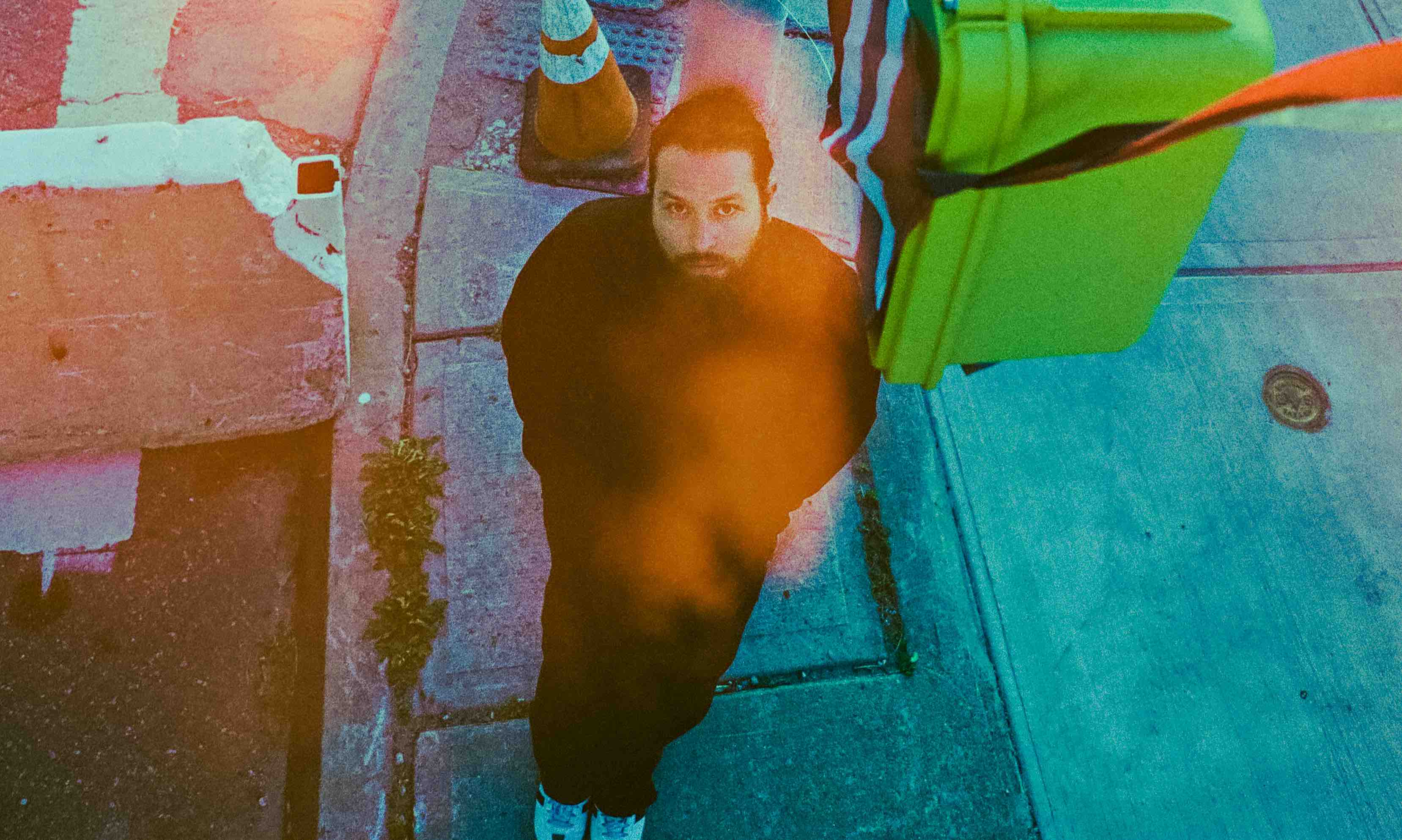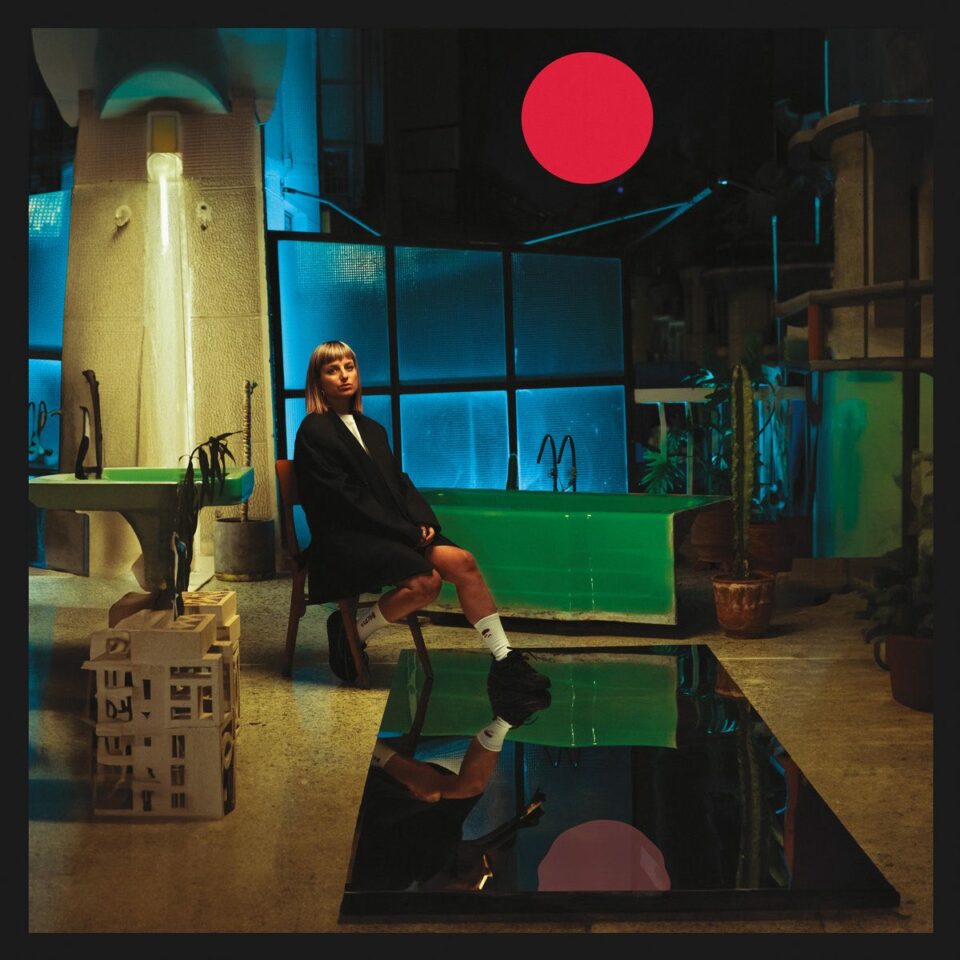When I chat with Nick Hakim, it’s been a month since his third album Cometa came into the world. The DC native’s third solo LP is fragile and shapeshifting, luring the listener with his crushed velvet vocals and finely layered, dreamlike instrumentation. Cometa has been pegged as an album about love, and although there are plenty of intimate scenes, these 10 tracks are most successful as portals into a meditative state.
It’s a few days before Thanksgiving and Hakim is Zooming in from his childhood home. He says it’s been a couple years since he’s been in his high school bedroom, and it’s a bit weird. There’s a purple venue access sticker from his hometown’s 9:30 Club next to his head (he explains that it’s from when he played there as a teenager), but the most unusual detail about this space is the dozens of Sharpie drawings on the wall. “I’ve kind of always done that,” he tells me. “It’s funny to see the beginnings—some friends wrote me some notes and stuff. It’s a trip when time passes and everything stays the same.”
As we continue to talk about Cometa and its creation, Hakim’s mind seems to be elsewhere. He’s forthcoming with his answers, but he cuts himself off before completing his thoughts. He begins to compliment his album before checking himself in the next sentence: “I love this record. I mean, I don’t know, I’m not doing anything super new.” He’s gotten in his head a bit, and whether he’s aware of it or not, there seems to be a bit of a battle going on with him reconciling his art and outside perception. “I wanted to focus on positive things that were around me,” he says at one point, trying to pin down exactly what Cometa is. “But also,” he adds defeatedly, “I don’t really care. It just is what it is.”
By the end of our chat, after opening up about industry stresses, Hakim is in much brighter spirits and describes to me how he’s been playing Cometa’s songs for his parents on their piano. As a whole, the hills and valleys of our conversation bring to mind a subtle but central lyric to the album: “Please just take me as I am,” he sings on the ambient highlight “Something.” “I’m not perfect, but I’m searching.” Aren’t we all.

How have you been since Cometa’s release?
I think things feel weird right now in general after everything that we’ve all kind of been dealing with—it’s like we woke up from a dream and now it’s back to normal. I played some really intimate shows recently that felt really good. Each city was a different situation band-wise. I went to London and Paris and did some solo stuff out there, which I haven’t done in years, but it’s something that I really want to keep doing. Anytime I would do a solo show it would be a weird karaoke of my songs. I’ve been playing guitar in open tuning, and honestly I’ve been winging it. It’s been fun to play these things in such a different way than they were originally made. It doesn’t sound exactly like the album.
“I’m finding ways to structure around something simple, like repetition. That goes into influences like Terry Riley and Steve Reich—I learned from those people how to think about music in a different way than it being a pretty chord progression.”
Was this album mostly recorded in the thick of the pandemic?
The first sessions started in Texas in July 2020. October 2020, I started to really tap into the songs. I made “Vertigo” first, and then “Ani” and “Feeling Myself.” We were at some studio in Texas for almost a month. So I was going through all that music that we did, and some of those sketches turned into this album. I had written maybe five songs that month that were down on the record. Then I kept experimenting—I had so many other things that no one will ever hear that were supposed to be on this record. There was one that used a broken speaker noise and I looped the sound. I added these really industrial sounding drums to it. There’s maybe six songs that were so all over the place in terms of style or whatever.
I think music these days is cool in that way. Everyone’s trying to blend all these things together, but there’s people who have been doing that forever, too. I really love Cornelius—I love his album Fantasma. He blends so many things, and he made that shit in the ’90s. It’s crazy.
“The visions in your mind / They will come true if you give it some time” is a lyric that’s repeated a few times on “Vertigo” and “Feeling Myself.” I was drawn to that because it feels like a manifestation.
Thank you, no one’s really even noticed that. I think about it all the time. That’s a really natural thing that I just said when I made “Vertigo.” I wanted to tie into something else on the record and put it into “Feeling Myself.” It’s trying to be optimistic. But also there’s a lyric [on “Ani”]: “I can’t tell if you’re real or if I’m dreaming.” I think about that a lot because I have a lot of dreams where I thought they happened, but they actually didn’t. I’ve been trying to figure out what that is. I think that’s normal. But memory can feel so weird…“Was that a real thing? I wish it was a real thing.” Or being like, “Thank God that that wasn’t real.”
I’ve been trying to figure out why this album feels so calming, and it does have that dreamlike quality. Certain repetition like on “Slid Under” feels like entering a meditative state.
“Slid Under” [was written with] guitarist Dylan Day, and his whole intention was basically trying for it to be like a loop. It felt like a meditation. He just sent me the guitar and then everything else was added on top. The vocals are completely bone dry except for the “Hoo-woos.”
“I want to make stuff that I love and am feeling in the moment. All these songs are assigned to certain moments of my life where I tapped into something, and I’m grateful for those moments.”
I think that’s one of the most important songs on this record. Those lyrics are completely improvised. I didn’t write anything down when I did that. I’m finding ways to structure around something simple, like repetition. That kind of goes into influences like Terry Riley and Steve Reich—I learned from those people how to think about music in a different way than it being a pretty chord progression and you’re going to sing something really cool over it. It’s more thinking about your intention behind it.
When people tap in and notice it, that’s all that matters. There’s going to be people that don’t understand what anyone does. I’m doing this for my own process to figure out my stuff. I’m also doing it for the people who are here for me. Obviously I want to be successful, but I want to make stuff that I love and am feeling in the moment. All these songs are assigned to certain moments of my life where I tapped into something, and I’m grateful for those moments.
It also shows—and I can say this with all my love—how much someone like Meshell Ndegeocello has influenced me. She’s been guiding me from a distance, and I love everything she does. I really think about her and her records a lot when I make music.

What’s important to you about her music?
How honest she is. How intentional she is. How thoughtful she is. It seems she’s using music as a way to heal from things that she’s dealt with. I love how her records sound. I love how rebellious she can be. I love how gentle she can be. I love how vulnerable she is. She’s a phenomenal, ridiculous bass player. I’m gonna do a show with her soon—I’ve gotten to know her a little bit and I’m grateful for that.
She paved the way for how I think about my records and my music. When you’re making music, what are your intentions? Is your music for everyone to hear? I want people to hear it who want to connect with it, but at the same time I’m trying to figure out how to make a living. Songwriters have this thing that if everything else was stripped away, [writing is] the most powerful thing that exists within the industry. It’s important to remember that there’s a lot more that you’re in control of than you think. People will try to make you think that you need [things like] a record contract—and obviously those things help.
Fuck, actually I’ve been drinking a little bit. I don’t know what’s going to be on or off the record with this interview. I do get in my head a little bit. FL









